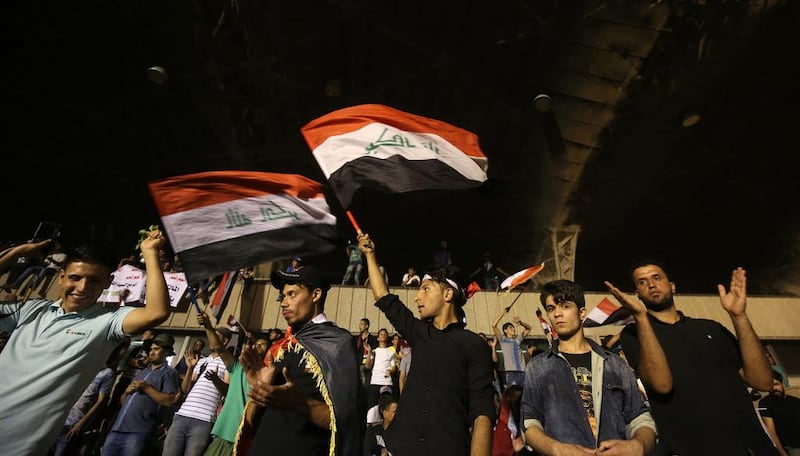Iraq’s political system is on life support. On Saturday, thousands of Iraqi protesters stormed the parliament after breaking into the green zone in Baghdad. The continuing crisis is the most serious challenge that has faced a political system established by the United States 13 years ago, especially as it comes amid profound and diverse social, economic and military tribulations that the country simply cannot resolve.
The protest movement was fuelled by the political and economic stagnation and bolstered by statements from the religious clerical authority Grand Ayatollah Ali Al Sistani in Najaf. A reform agenda advanced by the prime minister, Haider Al Abadi, was initially welcomed by Mr Al Sistani, who later criticised the premier’s reforms as “too slow”.
In February, the cleric declared “silence” during Friday sermons with regards to the political crisis and would refrain from further commentary on the situation. The sudden withdrawal sent mixed messages: was it a way to stay neutral or an expression of displeasure towards the pace of reform by the prime minister?
Shortly after Mr Al Sistani’s withdrawal, the notorious cleric Muqtada Al Sadr stepped in as the key player. The takeover, coming so soon after Mr Al Sistani’s announcement, gave the impression that Mr Al Sadr’s intervention was coordinated with the former.
Mr Al Sadr threatened steady escalation against the government, including asking protesters to enter the well-protected green zone, an exclusive fortress for the political elite since the invasion of Iraq. Demands included a government of technocrats, an end to the ethno-sectarian confessional political system and the integration of the government-aligned Hashd Al Shaabi militia organisation into the military and police. Instead, some of Mr Al Sadr’s supporters called for a majority rule.
In February, Mr Al Sadr threatened that his initial slogan of “Removing” (a reference to removing the corrupt politicians) change to “Removing and Uprooting” the political system. On March 27 he cancelled an anticipated storming of the green zone and announced that he would enter the zone on his own as a representative of the people. With the entry of the protesters on Saturday, the cleric has run out of cards, and what happens next is open to speculation.
The developments so far are already unprecedented. The fact that the protest movement is led and controlled by a powerful figure such as Mr Al Sadr might be a cause for relief, since matters can be contained.
Protesters displayed remarkable discipline, especially given the profound bitterness towards the political elite in Baghdad. Significantly, many of the protesters also shouted anti-Iranian slogans, notably “Iran, out, out”, which were heard during previous protests last year.
So, the popular desire for change can be an opportunity. The consensus among Iraqis seems to be that such demands for change cannot be ignored, and that previous instances of empty promises will not appease protesters. Genuine reforms appear to be the only way forward for the government.
The problem, however, is that the popular momentum for change is strong while the ability of the government to reform beyond cosmetic changes is weak. The country is also reeling under a diverse set of challenges ranging from a crippling economic crisis to continuing military and security challenges. American officials who recently met various Iraqi government officials report a depressingly dysfunctional country. In addition to the issues that culminated with the collapse of the army in northwestern Iraq, instability is reproducing new problems that make even sincere efforts to deal with the crisis much harder.
It did not help Mr Al Abadi that he has received strong regional and international backing in recent weeks, in the form of a long series of unprecedented calls of support from almost all the Gulf states and a surprise visit by the US vice president Joe Biden. The storming of the parliament was a wake-up call that his government is facing serious domestic problems that will be hard to deal with in the foreseeable future. He is also constrained by legal and power-sharing considerations that will be hard for him to ignore as he seeks to form a national salvation government and appease those who demand radical and quick change.
Twenty months ago, Mr Al Abadi was appointed prime minister to reverse the polarisation made by his predecessor Nouri Al Maliki and deal with the unravelling that followed the takeover of Mosul by ISIL. He worked hard to present himself as different from Mr Al Maliki – in many ways he was – but he failed to make a difference in the way the country functions.
Today, he faces a more complex and similarly urgent crisis. Jubilation throughout Iraq after protesters stormed the parliament should serve as a reminder that the country can no longer be ruled from inside a medieval concept fortress that the US established in Baghdad. Iraqis want a genuine change that the current political system, which thrives on corruption, cannot deliver.
Hassan Hassan is a resident fellow at the Tahrir Institute for Middle East Policy and co-author of ISIS: Inside the Army of Terror
On Twitter: @hxhassan





